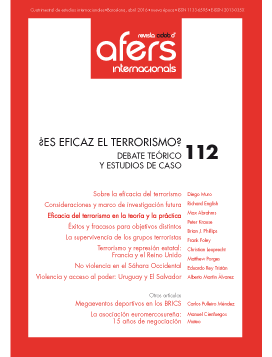¿Es eficaz el terrorismo? Consideraciones, problemas y marco de investigación futura
Palabras clave:
terrorismo, eficacia, investigación académica, debateResumen
Revista CIDOB d’Afers Internacionals, nº 112
Cuatrimestral (enero-abril 2016)
ISSN:1133-6595 | E-ISSN:2013-035X
DOI: https://doi.org/10.24241/rcai.2016.112.1.27
La cuestión de «si es eficaz el terrorismo» es de vital importancia tanto desde el punto de vista práctico como intelectual; no obstante, ha sido ampliamente eclipsada por otras consideraciones desarrolladas dentro de la literatura académica sobre el terrorismo. En este contexto, el presente artículo aborda algunas de las aportaciones recientes al debate emergente relacionado con dicha cuestión; destaca varias de las problemáticas inherentes a la discusión académica con respecto a este tema surgidas hasta la fecha; y, por último, esboza un marco para que la investigación académica futura en esta área tenga un carácter más inclusivo, sistemático y fructífero en el plano dialógico que el que ha tenido hasta la fecha.
Citas
Abrahms, Max. «Why Terrorism Does Not Work». International Security, vol. 31, n.º 2 (otoño de 2006a), p. 42-78.
Abrahms, Max. «Al-Qaida’s Scorecard: A Progress Report on al-Qaida’s Objectives». Studies in Conflict and Terrorism, vol. 29, n.º 5 (2006b), p. 509-529.
Abrahms, Max. «The Political Effectiveness of Non-State Violence: A TwoLevel Framework to Transform a Deceptive Debate». H-Diplo/ISSF, Response to Peter Krause (29 de junio de 2013). Bennett, Huw. Fighting the Mau Mau: The British Army and Counter-Insurgency
in the Kenya Emergency. Cambridge: Cambridge University Press, 2013.
Berrebi, Claude y Klor, Esteban F. «Are Voters Sensitive to Terrorism? Direct Evidence from the Israeli Electorate». American Political Science Review, vol. 102, n.º 3 (agosto de 2008), p. 279-301.
Chenoweth, Erica y Stephan, Maria J. Why Civil Resistance Works: The Strategic Logic of Nonviolent Conflict. Nueva York: Columbia Press, 2011.
Cormac, Rory. Confronting the Colonies: British Intelligence and Counterinsurgency. Londres: Hurst and Co Publishers, 2013.
Crenshaw, Martha. Explaining Terrorism: Causes, Processes and Consequences. Londres: Routledge, 2011.
Cronin, Audrey Kurth. Ending Terrorism: Lessons for Defeating al-Qaida. Londres: Routledge, 2008.
Cronin, Audrey Kurth. How Terrorism Ends: Understanding the Decline and Demise of Terrorist Campaigns. Princeton: Princeton University Press, 2009.
Dershowitz, Alan. Why Terrorism Works: Understanding the Threat, Responding to the Challenge. New Haven, Conn.: Yale University Press, 2002.
English, Richard. Armed Struggle: The History of the IRA. Londres: Pan, 2012 (reimpresión).
English, Richard (ed.). Illusions of Terrorism and Counter-Terrorism. Oxford: Oxford University Press, 2015.English, Richard. Does Terrorism Work? A History. Oxford: Oxford University Press, en prensa. 2009
Fortna, Virginia P. Does Peacekeeping Work? Shaping Belligerents’ Choices After Civil War. Princeton: Princeton University Press, 2008.
Gearty, Conor. Liberty and Security. Cambridge: Polity Press, 2013.
Gould, Eric D. y Klor, Esteban F. «Does Terrorism Work?». Quarterly Journal of Economics, vol. 125, n.º 4 (2010), p. 1.459-1.510.
Gupta, Dipak K. Understanding Terrorism and Political Violence: The Life Cycle of Birth, Growth, Transformation, and Demise. Londres: Routledge, 2008.
Hoffman, Bruce. Inside Terrorism. Nueva York: Columbia University Press, 2006.
Hoffman, Bruce. Anonymous Soldiers: The Struggle for Israel, 1917-1947. Nueva York: Alfred A. Knopf, 2015.
Horgan, John. The Psychology of Terrorism. Londres: Routledge, 2005.
Jackson, Richard y Sinclair, Samuel J. (eds). Contemporary Debates on Terrorism. Londres: Routledge, 2012.
Kydd, Andrew y Walter, Barbara F. «The Strategies of Terrorism». International Security, vol. 31, n.º 1 (verano 2006), p. 49-80.
LaFree, Gary; Dugan, Laura y Miller, Erin. Putting Terrorism in Context: Lessons from the Global Terrorism Database. Londres: Routledge, 2015.
Merari, Ariel y Elad, Shlomi. The International Dimension of Palestinian Terrorism. Boulder: Westview Press, 1986.
Neumann, Peter R. y Smith, Michael L. R. The Strategy of Terrorism: How it Works, and Why it Fails. Londres: Routledge, 2008.
Pape, Robert. «The Strategic Logic of Suicide Terrorism». American Political Science Review, vol. 97, n.º 3 (2003), p. 343-361.
Pinker, Steven. The Better Angels of Our Nature: The Decline of Violence in History and its Causes. Londres: Penguin, 2011.
Ramsay, Gilbert. «Why Terrorism Can, But Should Not Be Defined». Critical Studies on Terrorism, vol. 8, n.º 2 (2015), p. 211-228.
Rapoport, David C. «The International World as Some Terrorists Have Seen It: A Look at a Century of Memoirs». Journal of Strategic Studies, vol. 10, n.º 4 (1987), p. 32-58.
Rapoport, David C. (ed.). Inside Terrorist Organisations. Londres: Frank Cass, 2001.
Richards, Anthony. «Conceptualizing Terrorism». Studies in Conflict and Terrorism, vol. 37, n.º 3 (2014), p. 213-236.
Richardson, Louise. What Terrorists Want: Understanding the Terrorist Threat. Londres: John Murray, 2006.
Roberts, Adam y Garton Ash, Timothy (eds). Civil Resistance and Power Politics: The Experience of Non-Violent Action from Gandhi to the Present. Oxford: Oxford University Press 2009.
Schmid, Alex (ed.). The Routledge Handbook of Terrorism Research. Londres: Routledge, 2011.
Singh, Rashmi. Hamas and Suicide Terrorism: Multi-Causal and Multi-Level Approaches. Londres: Routledge, 2011.
Whitfield, Teresa. Endgame for ETA: Elusive Peace in the Basque Country. Londres: Hurst, 2014.
Wilkinson, Paul. «Politics, Diplomacy and Peace Processes: Pathways out of Terrorism?», en: Taylor, Max y Horgan, John (eds). The Future of Terrorism. Londres: Frank Cass, 2000, p. 66-82.
Wilkinson, Paul. Terrorism Versus Democracy: The Liberal State Response. Londres: Routledge, 2006.













